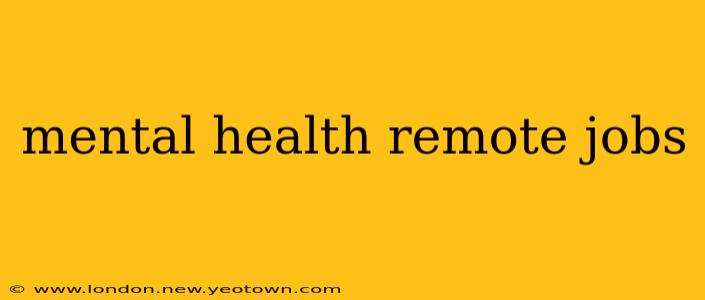The world of work is changing, and with it, our approach to mental wellbeing. More and more people are seeking flexible, remote opportunities, and the mental health field is no exception. If you're passionate about helping others and seeking a career that offers both professional fulfillment and work-life balance, then exploring remote mental health jobs might be the perfect path for you. This guide will navigate you through the possibilities, addressing common questions and offering insights into this growing sector.
What are the different types of remote mental health jobs?
The beauty of remote work in mental health lies in its diversity. It's not just about one type of job; it's a whole landscape of opportunities. Imagine this: you could be a licensed therapist, conducting sessions from the comfort of your home office, connecting with clients across geographical boundaries. Or perhaps you're a skilled case manager, coordinating care and providing support remotely. Maybe you're drawn to the world of research, contributing to studies and advancements in mental health from your home base. Other options include roles in telehealth administration, mental health coaching, or even content creation focused on mental wellbeing resources. The possibilities are vast and evolving, catering to different skill sets and experience levels.
How do I find remote mental health jobs?
Finding the right role begins with targeted searches. Think beyond the usual job boards; leverage platforms specializing in remote positions. Networking within the mental health community is invaluable; attend virtual conferences and engage in online forums to connect with potential employers and learn about hidden opportunities. Don't underestimate the power of your own professional network; let people know you're seeking remote mental health work. Tailor your resume and cover letter to emphasize your remote work skills and experience – highlighting your technological proficiency, self-management abilities, and commitment to maintaining client confidentiality in a remote setting. Remember to showcase how your skills directly translate to the requirements of the position.
What skills are needed for remote mental health jobs?
Beyond your clinical qualifications (if applicable), several key skills are essential for success in remote mental health roles. Strong technology skills are a must; you need to be comfortable using various telehealth platforms and ensuring HIPAA compliance in a virtual setting. Excellent communication skills are vital, as you'll be interacting with clients primarily through video conferencing and electronic messaging. Self-discipline and time management are paramount; creating a structured and productive work environment is crucial. Strong problem-solving skills are needed to navigate technical issues, scheduling conflicts, or unexpected client needs. Finally, empathy and compassion, the cornerstones of any mental health role, remain essential regardless of the work setting.
What are the benefits of working remotely in mental health?
The benefits are substantial. Imagine a career that offers flexibility, allowing you to set your own hours and work from anywhere with a reliable internet connection. This can lead to a significant improvement in work-life balance, reducing stress and burnout often associated with traditional office settings. Remote work expands your geographical reach, allowing you to serve clients who might not otherwise have access to mental health services. It can also offer greater autonomy and control over your work environment, promoting a sense of ownership and job satisfaction. This flexibility is particularly beneficial for individuals who live in underserved areas, have caregiving responsibilities, or simply prefer a less conventional work arrangement.
What are the challenges of remote mental health jobs?
While the advantages are many, it's important to acknowledge the challenges. Maintaining professional boundaries while working from home can be demanding; creating a dedicated workspace is crucial. Technical issues and internet connectivity problems can disrupt sessions and require quick problem-solving. Building rapport with clients in a virtual environment takes skill and sensitivity; you need to be able to create a trusting and therapeutic connection despite the physical distance. Ensuring client confidentiality and adherence to HIPAA regulations in a remote setting requires meticulous attention to detail and ongoing vigilance. The lack of in-person interaction with colleagues can also lead to feelings of isolation, highlighting the importance of maintaining virtual connections with your professional network.
How do I ensure client confidentiality in a remote setting?
Protecting client confidentiality is paramount. Choose telehealth platforms with robust security measures and HIPAA compliance. Ensure your home workspace is private and free from distractions that could compromise confidentiality. Familiarize yourself with the latest HIPAA regulations regarding telehealth and follow them meticulously. Use encrypted communication methods for all client interactions. Regularly review and update your security protocols to address evolving technological threats. Remember, maintaining client confidentiality is not just a requirement but a fundamental ethical responsibility.
The journey into remote mental health jobs is an exciting one. By understanding the various roles, developing necessary skills, and addressing potential challenges, you can pave the way for a fulfilling and impactful career that combines your passion for mental health with the flexibility and autonomy of remote work. The future of mental health is increasingly digital, offering a wealth of opportunities for compassionate professionals who embrace the possibilities of the modern workplace.

